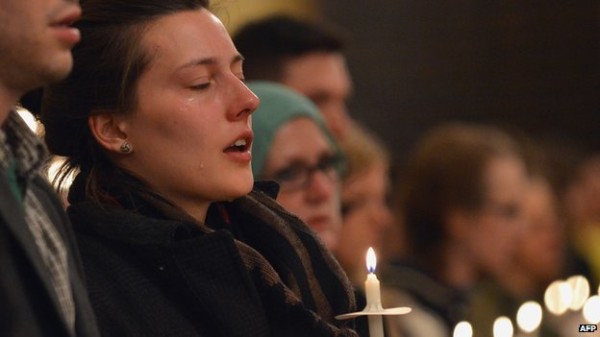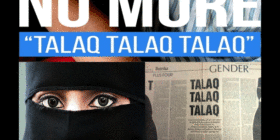As the investigation into who was behind the Boston bombings goes on, Muslim communities are braced for a backlash should the perpetrator share their faith.
The day after the Boston Marathon bombings, Yusef was treated differently.
The 10-year-old went to his Ohio-area school and was surprised by a question from a classmate, according to his family. While the class was discussing the explosions, the classmate is said to have asked: “Does that mean Yusef is going to blow up the school?”
A confused Yusef, whose family asked that his last name not be used, says he repeated the classmate’s question. But the teacher apparently only heard Yusef’s end of the exchange, a misunderstanding that resulted in detention and having his locker searched.
This story is exactly what Anum Hussain feared when she first heard of the bombings. Hussain is a regional director with the Muslim Inter-Scholastic Tournament and teaches Muslim youth about bullying.
Having grown up in the aftermath of 9/11, Hussain worries that this generation of Muslims could be bullied because of the blasts – especially if the person responsible is a Muslim.
“The sad truth is that regardless of the facts, people are already getting unfairly stereotyped,” says Hussain.
“We’re all on the edge of our seats praying that the person who did these acts isn’t a Muslim. We’re tired of being blamed for the actions of one person.”
It’s a sentiment shared by many, especially among Arab, African, Asian and Sikh Americans. As the FBI investigation inches closer to finding a suspect, these communities fear a new wave of ethnically charged violence and harassment.
Some Muslims see progress in the way they are treated, and are heartened by the official response to the Boston attacks, which has used language with care and deliberation.
“It starts with the leadership of the country, if they are being able to do this slowly, it will trickle down to the people,” one woman at a meeting of the Islamic Society of Northeastern University told BBC
“Even news and online articles are starting to tone down a little from a few years ago. People are starting to understand that not all Muslims are bad.”
But others are concerned that the good work of the past few years could be quickly undone if the bomber is Muslim.
“Despite some of the headway and normalcy achieved since 9/11, it could be extinguished in an instant if the perpetrator fits the caricature of a terrorist,” says Khaled Beydoun, a critical race studies fellow at UCLA School of Law.
When Beydoun heard about the Boston attacks, he was worried about a friend who was running in the marathon. But a familiar fear crept into his mind as he thought about who was responsible for the attacks.
From crises such as the Newtown shootings to the blasts in Boston, Beydoun has always worried about the national reaction if the perpetrator is a Muslim or “looks” Muslim.
“It’s part of this collective consciousness that Muslims and Arab-Americans experience in any time of crisis,” says Beydoun.
He thinks that white suspects are treated differently to suspects from minority groups.
“With a white American versus an Arab or Muslim American, we know from previous incidences that a white terrorist will be framed as an individual aberration,” he says.
“Whereas a culprit who is an Arab, Muslim or black American will vilify an entire community of people.”

Muslims in Boston discuss their fears with the BBC’s Franz Strasser
Many people point to the shootings in Newtown, the Oak Creek, and Aurora as examples – the white men all responsible for those tragedies were described as being mentally ill, not representative of an entire culture or race.
As major cities across the nation tightened security to prepare for additional threats, Muslims and advocacy groups braced for their own set of dangers. Past data points to spikes in hate crimes associated with major attacks in the US, especially after 9/11.
The Muslim Public Affairs Council is one of the organisations preparing for a potential backlash against Muslims in the US.
President Salam Al-Marayati says the organisation has reached out to Homeland Security officials and law enforcement, routine steps for any advocacy group working with Muslims and vulnerable communities.
While no-one can predict the magnitude of response if the person responsible for the Boston bombings is Muslim, it could be comparable to 9/11, says Trevor Aaronson, author of the Terror Factory.
“You’ll see a similar ratcheting up of Islamophobia that right now exists under the surface,” he says.
The prospect of harassment reminiscent of the post-9/11 environment worries Hussain.
“I didn’t start getting bullied until after 9/11,” says Hussain. “And it continued through middle school, through high school and up to college; it’s not something that ever stops.”
Muslims have been under the public microscope since Monday’s bombings.
In the absence of facts and a suspect, pundits are scrambling to speculate on who is to blame. Inaccurate media reports quickly identified a Saudi national as a person of interest, but the man was later cleared of any association with the attacks – he was merely a victim of the explosion.
“The fact that this individual was brown, Arab-looking and on site put him within the terrorist caricature that people have in mind,” says Beydoun.
An outpouring of tweets and blog posts have also been circling the social sphere. Many of the messages are ones of support, but several expose a xenophobic undercurrent in the American response to the tragedy. Tweets with racist expletives blamed “sand monkeys” and “towel heads” for the attacks, while the word “Muslim” even trended on Twitter this week.
While many people say it shouldn’t matter what the culprit’s faith or ethnicity is, Beydoun knows it will sadly have major significance.
“Does it matter if it’s a Caucasian woman?” he asks. “No, probably not. But does it matter to the millions of Muslims living in the US? Yes, it does. It has very practical significance on the trajectory of our entire lives, and on the frightening backlash against entire communities.”
For Hussain, while she’s frustrated with some of the reactions since the bombings, she’s overwhelmed by the support from the Boston community and remains hopeful for a fair outcome of the FBI investigation.
“My hope is that regardless whether the person who committed these terrible acts is white, Muslim or black, people will remain understanding,” she says.
“People will understand that the bombings have nothing to do with any group or religion.”
It’s a hope she clings to while watching the news with anticipation.






Leave a reply